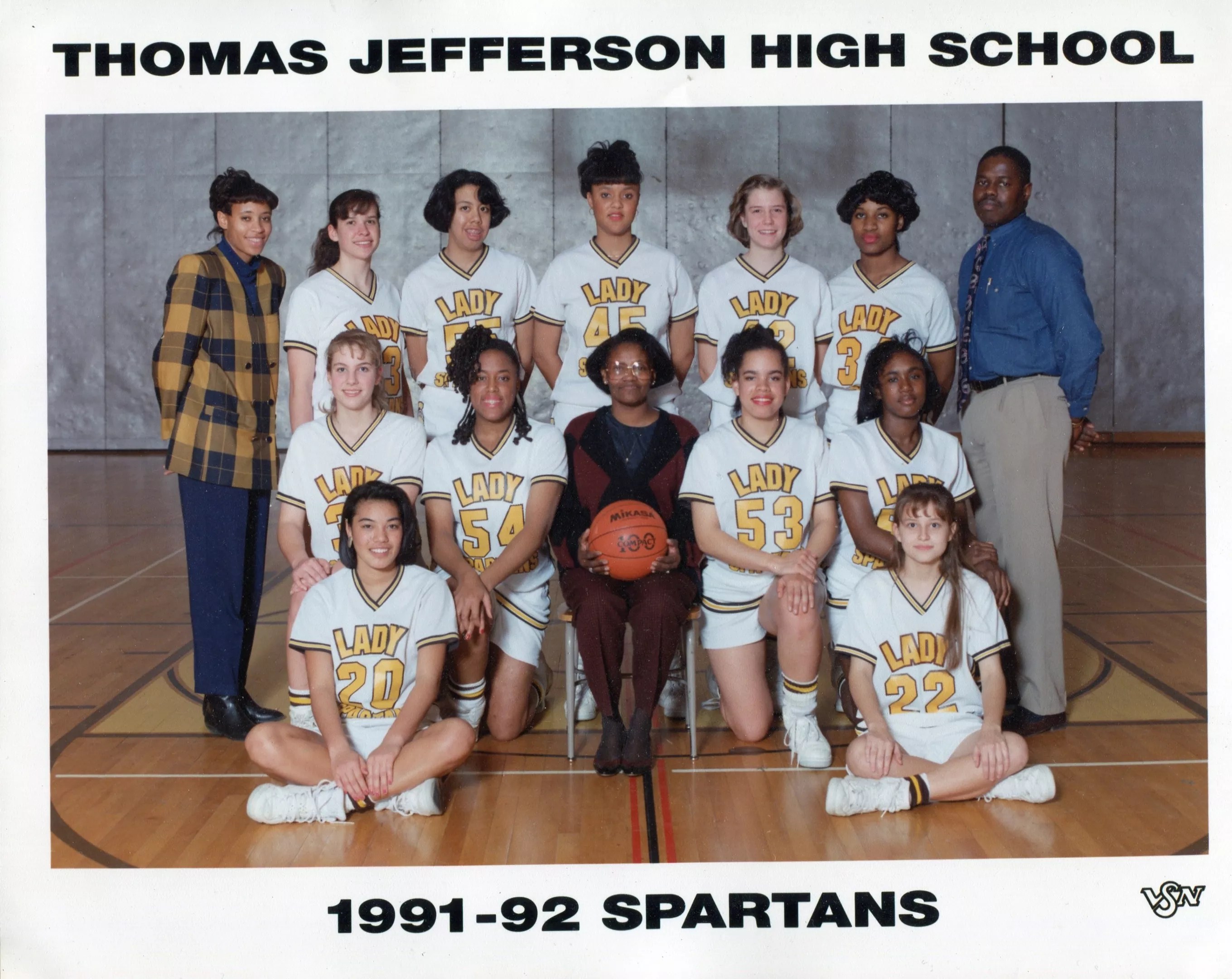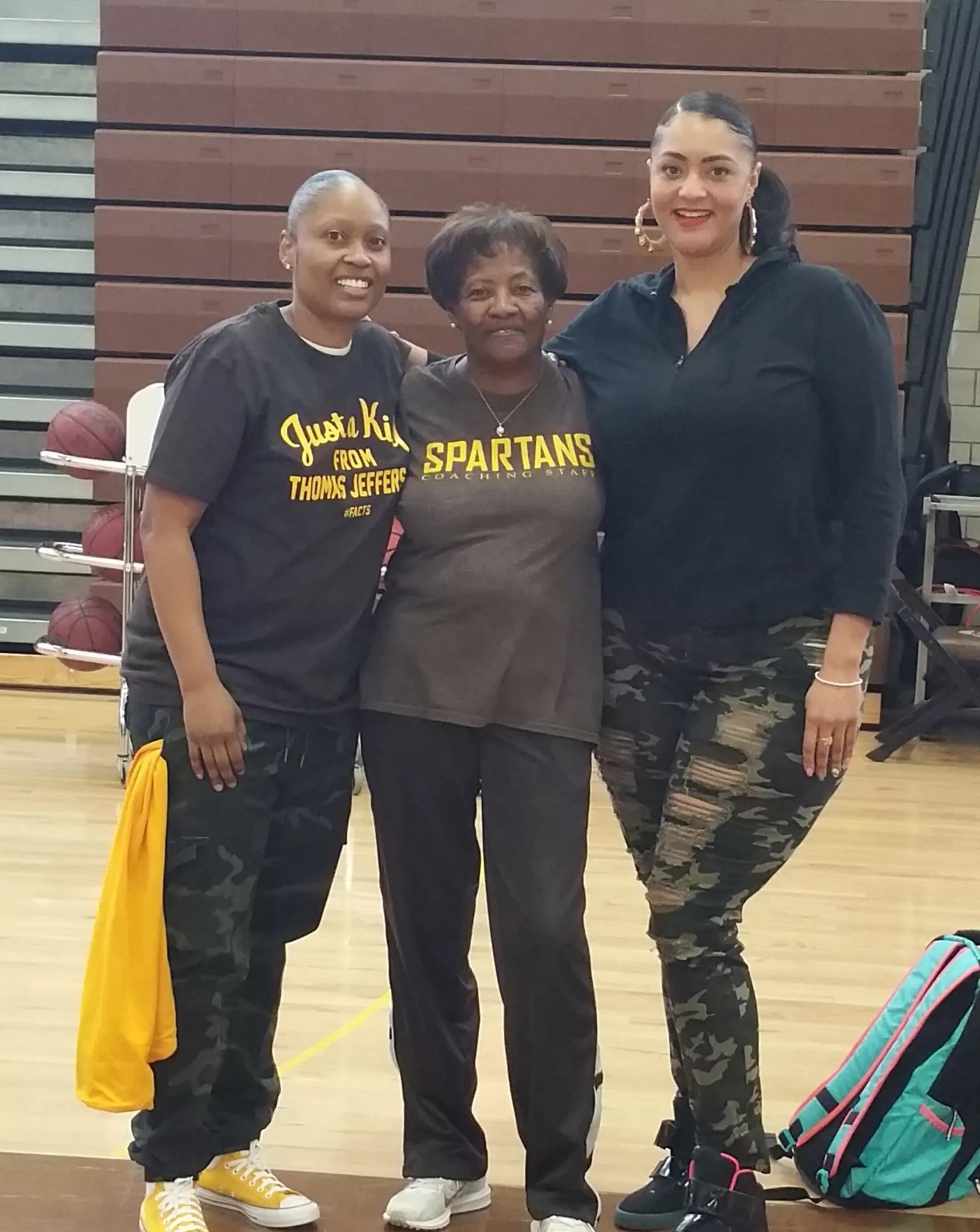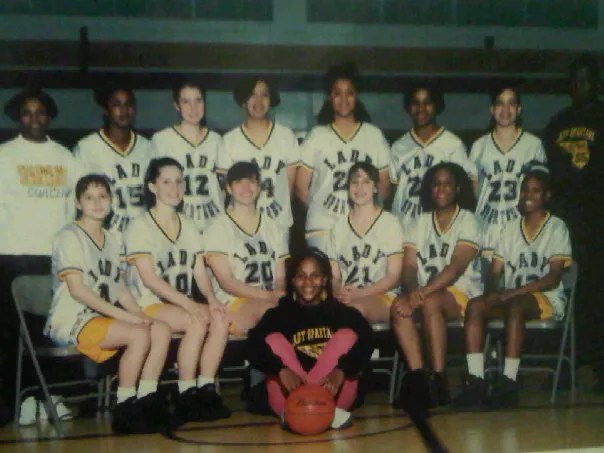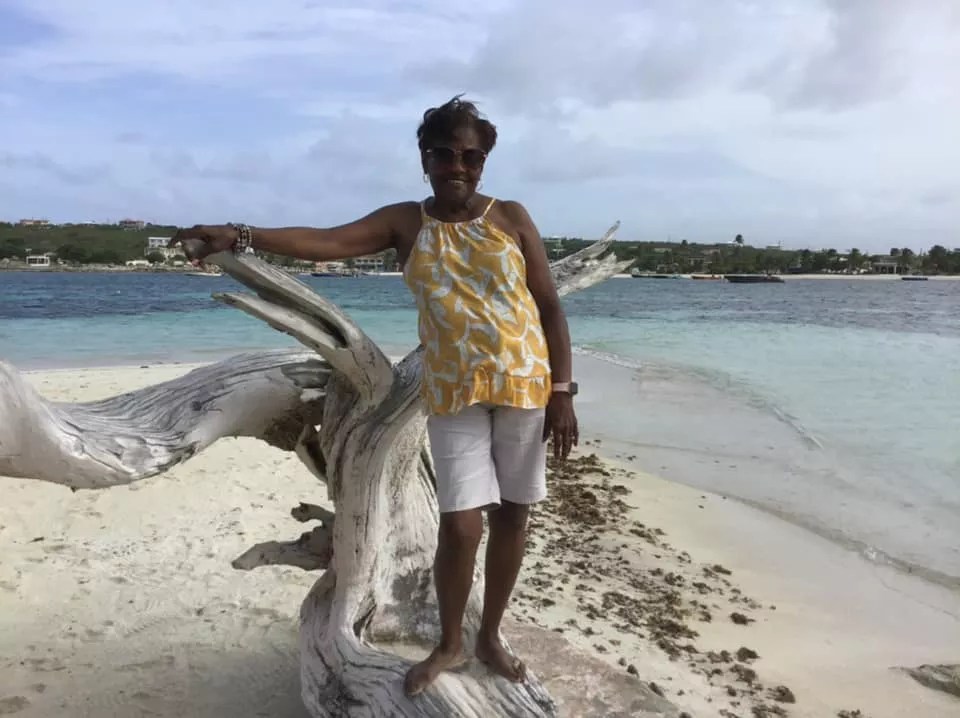
Courtesy Jenny Shank

Audio By Carbonatix
Thomas Jefferson High School girls’ basketball coach Kathryn Kindle-Hughes – one of Denver’s true heroes in the world of high school sports and student mentorship – died last month at the age of 82.
Kindle-Hughes’s legacy extends far beyond the hardwood, and students and family members remember her as much more than just a coach.
“There were so many people that she was like a mother figure to,” says granddaughter Ameerah Kindle. “If they were having problems at home, she helped them. If they needed help paying to get into summer camp or something like that, she helped them from her own pocket. … It was really incredible to hear people share those stories and just realize that I wasn’t the only person that lost their grandmother, in a way.”
Kindle-Hughes died on April 27, leaving behind a history that many feel is impossible to quantify. “When you talk about an angel right here on Earth, to me, my mother was really an angel,” says her eldest son and Ameerah’s father, Michael Kindle.
A funeral and memorial service were held on May 12; those close to the coaching legend met at Thomas Jefferson that weekend and swapped memories of her success. In her time at the school, Kindle-Hughes led teams to city championships and was known throughout Denver’s sports scene for her legendary approach to both life and the game of basketball.
“So many people got up from different times in her life,” Ameerah recalls. “People who graduated from the class of 1992, people who graduated from the class of 2002, current students that were just a week or two shy of graduating this year. … It kind of just solidified in my mind how much of a staple she was in the community.”
Kindle-Hughes graduated from the University of Arkansas at Pine Bluff with a degree in social work, and was also a basketball player. She came to Denver in 1979 seeking treatment for her son, Tyrone, who had sickle cell anemia.
According to Michael, once she got to Denver, she knew she wanted to shift gears and work with children, and she became a substitute teacher.
She taught at Montbello before landing at Thomas Jefferson, where she was the head girls’ basketball coach from 1985 until February 2023. In her nearly forty years at the school, Kindle-Hughes helped many student athletes – including those in track, whom she also coached – giving them much more than just simple coaching tips.
“You don’t just hop on the court, grab a ball and shoot,” says Shontell Brown, a Commerce City software engineer who played for Kindle-Hughes at TJ in the 1990s. “You have to understand the rules, the mentality of your teammates, the mentality of your opponent.”
Ameerah says her grandmother would often drive students to and from practice, and she was always there for the ones with difficult home lives. Kindle-Hughes eventually earned a master’s degree in Education Leadership from the University of Northern Colorado, but she was also a student of the game.

Shontell Brown (left) and Kathryn Kindle-Hughes stayed close after Brown graduated.
Courtesy Shontell Brown
Brown went on to play college basketball at the University of Oklahoma, and credits Kindle-Hughes’s basketball chops with preparing her. Kindle-Hughes also taught Brown how to balance classes and basketball practice as a student-athlete by taking her to college camps at the University of Colorado and the University of Kansas.
“I’ve always been fairly intelligent, and I was afraid to show that in high school, because in the community I come from, it’s frowned upon if you’re smart,” Brown says. “[Kindle-Hughes] made me realize that that’s okay.”
Brown says her former coach’s belief in her ultimately helped get her where she is today as a software engineer. “She never let me be mediocre; she never let me do things halfway,” Brown says. “She just pushed me to the max. That’s how I feel like I became great on and off the court.”
Justine Craft-Taylor – TJ’s current C-Team coach – met Kindle-Hughes her freshman year and stayed close with her after graduating. Kindle-Hughes had encouraged her to try out for the basketball team despite Craft-Taylor not having experience in the sport.
“I don’t know what it was about her presence, but I instantly wanted to play for her,” Craft-Taylor remembers. “I wanted to impress her. I wanted her to see me. I wanted to make her proud.”
Craft-Taylor wound up making varsity by the middle of her sophomore year and went on to run track under Kindle-Hughes’s supervision as well. Through basketball, Kindle-Hughes taught her the true meaning of effort, preparation, sacrifice, self-regulation and how to deal with losses and disappointments.
“Loss in basketball – just as in life – is painful, sad, and requires quick recovery to prepare for the next game or situation,” Craft-Taylor explains. “[It’s] probably one of the easiest and most practical ways to teach and reach hundreds of young women of all nationalities, races, physical abilities and financial access. Kindle had a God-given gift that she unselfishly shared with the world.”
Her students remember Kindle-Hughes not only for her mentorship, but also for her tough-love mentality. When she cared, she cared hard – and could be demanding when she saw someone not living up to their potential. But that’s what turned her into a mother figure for people like Craft-Taylor, who says Kindle-Hughes was truly her family.
“During my school experience, in all my advanced classes, I was the only Black female in classes with all white students in front of all white teachers,” Craft-Taylor says. “I never saw myself until I experienced Coach Kindle. Educated, athletic, strong, feminine and Black, but also relatable.”

Kathryn Kindle-Hughes (back left) led this team to the City Championship.
Courtesy Shontell Brown
Maia Parish is another student who says she benefited from having Kindle-Hughes as a Black role model. Parish transferred to Thomas Jefferson for her junior and senior years in the early 1990s after going to a private school, where she says she had lost herself. She remembers Kindle-Hughes as her only Black teacher.
“I was having identity issues connecting with my own culture being Black,” Parish recalls. “I took the African American literature class to help me.” It was a class that Kindle-Hughes taught.
Like countless others, Parish ended up playing basketball and was one of the athletes that Kindle-Hughes sometimes drove home after practice. Though they didn’t keep in touch, Parish says she still uses what Kindle-Hughes taught her in her everyday life working as a sommelier.
“I live in, and I work in, an environment where it’s mostly white,” she says. But Kindle-Hughes taught her about “getting through, pushing through, continuing to do the hard work and never settling.”
While pouring so much into her students, Kindle-Hughes also poured love into her large family. After her first husband, Samuel, died, she married Jonah Ansel Hughes in 2014. Kindle-Hughes had eight children – six of whom are still alive – along with many grandchildren and great grandchildren. Ameerah lives in New York City and works as a vocalist. Like Shontell Brown, she says her grandmother’s mindset has helped her tremendously in her career.
“What was most important to her was just keeping your head up and continuing to have a drive that pushes you forward to be successful,” she says.
Michael remembers his mother first and foremost as a giver. He says she would do what she could to make sure everyone felt good, especially around the holidays. Getting done up was also a specialty of hers, along with her impressive dance moves and graceful presence.

Kathryn Kindle-Hughes loved the Anguillan beach.
Courtesy Shontell Brown
“I don’t remember a time that I ever saw my grandma’s hands without her nails done,” Ameerah says. “When I think of my grandmother, I just think of how beautiful of a woman she was.”
One of Ameerah’s favorite memories is from a barbecue a few years ago, when her older sister arranged a dance contest for the great-grandchildren and Kindle-Hughes couldn’t help but participate, despite nearing her eighties. Michael says he never heard his mother tell a lie or saw her make a misstep: She was goodness and toughness personified.
Brown stayed connected with Kindle-Hughes after she graduated. She took her former coach to the NCAA Women’s Final Four in Denver in 2012, giving back to a woman who had cared for her so deeply. “I’ll never forget the look on her face,” Brown says. “We had the best time.”
Craft-Taylor helped care for Kindle-Hughes in hospice. Like Brown, she relished the chance to return some of the care Kindle-Hughes had given her.
“Coach Kindle’s constant, unconditional presence in my life created a safe place for me,” she says.
Though Kindle-Hughes was mainly a women’s basketball fan, the two watched the Denver Nuggets beat the Minnesota Timberwolves days before Kindle-Hughes’s death. “Even in pain, and as life was leaving her day by day, she still wanted to enjoy watching a good game of basketball,” Craft-Taylor says.
Kindle-Hughes’s desire for good, even as her life dwindled, was reflected in the stories people shared at her memorial service. Ameerah remembers there being as many laughs as there were tears.
“In that moment, we were all connected by my grandmother’s legacy,” she says. “I felt really touched and honored to even be related to her. Even afterward, I had people coming up to me saying, ‘Thank you and your family so much for sharing her,’ and it just…it just filled me with a sense of pride. She really was just a beacon of love and hope and support and hard work.”